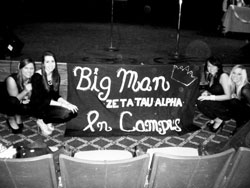The Greek community held a town hall meeting last Wednesday afternoon in Pollak Theatre that discussed possible changes to the current Greek system.
Greek life was suspended by the University’s administrators on Sept. 6 following a rocky spring semester that saw two fraternities shut down for severe hazing allegations and the alcohol-related death of a student after a fraternity party, poor academic performance, and poor community involvement.
This event featured a panel led by Greek Senate President Henry Tran, Inter-Fraternity Council President Andrew Ziminski, Panhellenic Treasurer Marisa Creta, and Multicultural Greek Council President Faridat Busari. Twelve of the sixteen recognized organizations’ Presidents were in attendance with the other four organizations sending delegates, as well as President Grey Dimenna, Esq., Vice President For Student Life and Leadership Engagement Mary Anne Nagy, and community members.
27 possible changes to the Greek system were discussed including raising the required GPA for new members from 2.5 to 2.75, clarifications on recruitment events, and taking of underclassmen’s contact information at events such as Meet The Greeks.
Additionally, the fate of Greek life for the spring 2019 semester is still uncertain.
“We’ve been in contact with office of student activities and we spoke with Amy [Bellina, Director of Student Activities and Student Center Operations] and we wanted to be very clear: Recruitment is not guaranteed for the spring,” said Creta. “It will not be the same weekend, it will most likely be pushed back when and if that happens. So, let’s not spread rumors about that, but we’re working with the office to work that all out.”
The new deadline for the submission of a reformative proposal to administrators is Friday Nov. 16.
“The IFC new member average was the lowest average in the spring of 2018, as well as the Panhellenic average which was below the all campus average and all women’s average,” said Ziminski.
Bid night, where Greek members discover if their selected Greek organization will accept them, was also on the chopping block.
“75% of members must be present until midnight,” said Creta on behalf of the Panhellenic Council. “The main point of this is just to ensure that mixers and stuff don’t go on after bid night. If something happens still happen after that, we will take measures based on Greek Senate or the school.”
Another possible reform mentioned was a report card for an individual organization that would cover all members in an organization. The idea of a newsletter to University alumni also may come into fruition.
“Something we want to start doing, is interacting more with parents, alumni, and alumni advisors, and our initiative to communicate more with parents is through a newsletter,” said Tran. “It’s worth mentioning the publicity was a little too negative, so this would capture all the positives, such as community service, philanthropy, and so on.”
Tran also asked the Greek community for patience. “When this proposal takes place, it won’t be easy,” he said. “It takes time to implement this at a chapter level and as a council. The platform of the greek community won’t be the same, as to what it was. The things are not going back to what they were.”
The Greek leadership councils met with a consultant on Oct. 21 named David Westol, owner of Limberlost Consulting, Inc. to help formulate major elements that need redress. David Westol could not be reached for comment. Tran thanked him for his help during the town hall meeting.
After the discussion, Nagy commended the Greeks for their presentation. “I think this presentation was a great show of responsible leadership on behalf of the Greek councils,” she said. “I would like to see the full proposal, but there was a number of interesting things they mentioned.”
Nagy continued, “Their outreach to the community is important. I think that demonstrates it’s beyond them and beyond nearby communities.”
Dimenna was alos pleased with the nature of the discussion. “I was very pleased with how they communicated with the Greek community,” said Dimenna. “they’re taking responsibility.”



